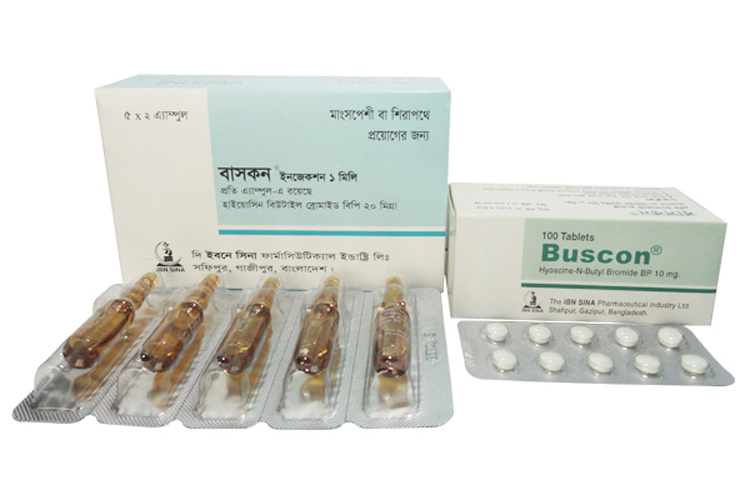
BUSCON
HYOSCINE BUTYLBROMIDE BP
| NAME | STRENGTH | PACK SIZE | DOSAGE FORM |
|---|---|---|---|
| BUSCON INJECTION | 20 MG/ ML | 10 S | INJECTION |
Each 1 ml ampoule contains Hyoscine Butylbromide BP 20 mg.
Hyoscine butylbromide is a quaternary ammonium antimuscarinic agent. Hyoscine butylbromide does not readily pass the blood-brain barrier. It is a competitive antagonist of the actions of acetylcholine and other muscarinic agonists.
Hyoscine butylbromide is used in the treatment of conditions associated with gastrointestinal spasm.
The usual dose is 20 mg intramuscular or intravenous, repeated after 30 minutes, if necessary.
Hypersensitivity to Hyoscine butylbromide. Patients with prostatic enlargement, paralytic ileus or pyloric stenosis. It should not be given to patients with myasthenia gravis, unless it is to reduce the adverse muscarinic effects of an anticholinesterase agent. It should be given with caution to pregnant and lactating mothers as safety has not yet been established. It has been stated to cross the placenta.
Buscon should not be taken on a continuous daily basis or for extended periods without
investigating the cause of abdominal pain.
Patients intolerant of one belladonna alkaloid or derivative may also be intolerant of other belladonna alkaloids or derivatives such as hyoscine butylbromide.
After parenteral administration of Buscon , cases of anaphylaxis, including episodes of
shock have been observed. As with all drugs causing such reactions, patients receiving
Buscon by injection should be kept under observation.
Parenteral Buscon can cause serious and severe cardiac adverse reactions consisting of tachycardia and hypotension (see CONTRAINDICATIONS and Cardiovascular).
One sugar-coated tablet of 10 mg contains 41.2 mg sucrose, resulting in 411.8 mg sucrose per
maximum recommended daily dose. Patients with the rare hereditary condition of fructose
intolerance should not take this medicine.
Dryness of the mouth, with difficulty in swallowing, thirst, dilatation of the pupils with loss of accommodation and photophobia, increased intra-ocular pressure, flushing and dryness of the skin, bradycardia followed by tachycardia, with palpitations and arrhythmias, urinary urgency with the inability to do so, as well as reduction in the tone and motility of the gastrointestinal tract, leading to constipation. Occasionally vomiting, giddiness and staggering may occur. Retrosternal pain may occur due to increased gastric reflux.Patients who experience drowsiness should not drive or operate machinery. Alcohol should be avoided. It has been stated that in elderly patients and patients with inpaired metabolic, liver or Kidney function, adverse central nervous system effects such as disorientation, delirium or somnolence have been more likely to occur. It should be used with caution in conditions characterized by tachycardia such as thyrotoxicosis, cardiac insufficiency or failure, and in cardiac surgery where it may further accelerate the heart-rate. Care is required in patients with acute myocardial infarction as ischemia and infarction may be worsened. It should be given with care to patients with hypertension.Hyoscine should be used with care in patients receiving other central depressants concomitantly, as central nervous system depression may be enhanced.
The effects of antimuscarinic agents may be enhanced by drugs with antimuscarinic properties, such as amantadine, some antihistamines, butyrophenones and phenothiazines, and antidepressants.
Symptoms of overdosage:Toxic doses cause tachycardia, rapid respiration, hyperpyrexia, restlessness, confusion, excitement, impotence and hallucinations passing into delirium. A rash may appear on face and upper trunk, In severe intoxication, depression of the central nervous system may occur with circulatory failure and respiratory failure.
Quaternary ammonium anticholinergic agents usually have some ganglion blocking action, so that high doses may cause postural hypertension and impotence in toxic doses, nondepolarising neuromuscular block may be produced. Supportive and symptomatic therapy should be given as required.
There is limited data from the use of hyoscine butylbromide in pregnant women.
Animal studies do not indicate direct or indirect harmful effects with respect to reproductive
toxicity.
There is insufficient information on the excretion of Buscon and its metabolites in human
milk.
As a precautionary measure, it is preferable to avoid the use of Buscon during pregnancy
and lactation.
No studies on the effects on human fertility have been conducted.
As hyoscine butylbromide can reduce the motility and secretory activity of the gastrointestinal
system, the systemic absorption and pharmacologic effects of other oral medications may be
delayed.
If you think you have taken too much BUSCOPAN, contact your healthcare professional, hospital emergency
department or regional Poison Control Centre immediately, even if there are no symptoms.
Store in a cool & dry place.
Each box contains 5's x 2 blistered 1 ml ampoule.
